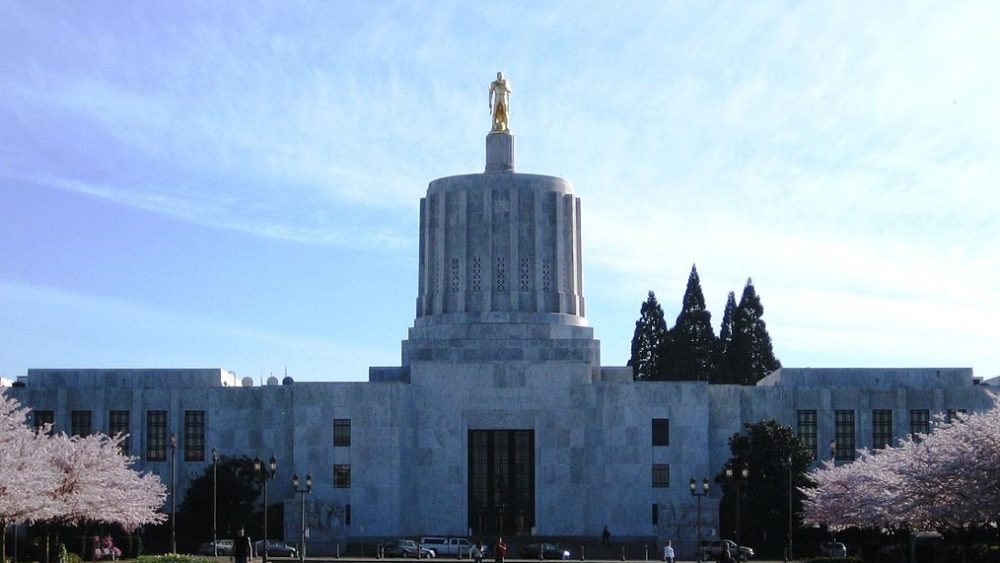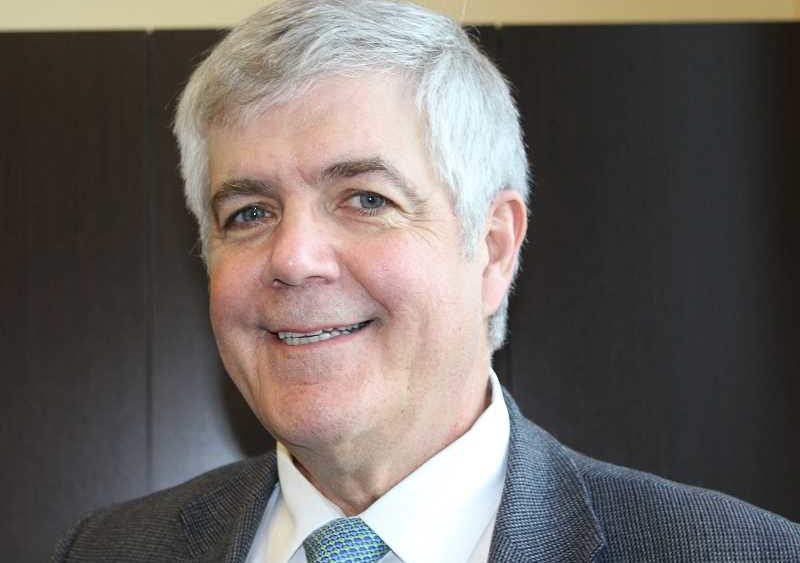February 5, 2020 •
Oregon Referendum Process Could Change

Oregon State Capitol Building
Salem attorney Steve Elzinga has proposed changes to the state administrative rules to prevent manipulation of a mechanism allowing citizens to stop new laws passed by legislators. Our Oregon, a union backed political group, is alarmed about the proposed changes […]
Salem attorney Steve Elzinga has proposed changes to the state administrative rules to prevent manipulation of a mechanism allowing citizens to stop new laws passed by legislators.
Our Oregon, a union backed political group, is alarmed about the proposed changes to the state’s election rules.
The group says the rules give special interests excessive influence.
The opposing sides argue they are defending the ability of voters to directly access the state’s political system.
The Office of the Secretary of State held a hearing on the rule changes earlier this week. Secretary of State Bev Clarno could decide on the rule changes as soon as next month.
In Oregon, if citizens want to challenge a new law passed by the Legislature they can put it to a statewide vote by using the state’s referendum process.
Citizens have 90 days after the Legislature adjourns to petition for a referendum, unless a new law is written to take effect right away.
The number of signatures required to trigger a referendum is based on turnout in previous elections
The number of signatures required is currently 74,680.
However, signatures can’t be gathered until the governor signs the legislation into law.
The proposed change would permit collecting signatures for a referendum as soon as the targeted legislation passes both the House and the Senate.
Governors have 30 business days after the Legislature adjourns to sign a bill into law.
The change would prevent governors delaying the signing of a bill to chew up some of the 90 days set aside for petition work.
January 30, 2020 •
Oregon Democrats Seek to Delay Campaign Contribution Limits Until July 2021

Oregon State Capitol Building
House Democrats introduced a bill putting the 2006 voter approved campaign contribution limits on hold until at least July 2021. House Bill 4124 would give lawmakers more time to pass new campaign contribution limits to replace those approved by voters. […]
House Democrats introduced a bill putting the 2006 voter approved campaign contribution limits on hold until at least July 2021.
House Bill 4124 would give lawmakers more time to pass new campaign contribution limits to replace those approved by voters.
The bill would allow the Legislature to appoint a task force to study campaign finance and make recommendations on how to best establish effective political contribution limits.
Currently, Oregon has no campaign contribution limits because courts have repeatedly struck down or suspended them, including the initiative voters passed almost two decades ago.
The Oregon Supreme Court is expected to rule on Multnomah County’s voter approved campaign finance limits at some point this year.
A ruling in favor of the campaign finance limits would likely revive statewide donation caps as well.

Oregon State Capitol Building
Akasha Lawrence-Spence was selected by the Multnomah County Commissioners in Oregon to fill the unexpired term of Rep. Jennifer Williamson. Rep. Williamson resigned from the House District 36 seat in late December to run for secretary of state. The unexpired […]
Akasha Lawrence-Spence was selected by the Multnomah County Commissioners in Oregon to fill the unexpired term of Rep. Jennifer Williamson.
Rep. Williamson resigned from the House District 36 seat in late December to run for secretary of state.
The unexpired term ends in January 2021.
Lawrence-Spence will serve through the remainder of the upcoming 2020 legislative session.
Candidates will vie for the District 36 seat in this year’s primary election.
January 9, 2020 •
Portland Commissioner Fish’s Passing Triggers Special Election
Commissioner Nick Fish passed away on January 2, creating a vacant council seat. The Portland City Council chose the May 19 municipal primary election date for a special election to fill the vacancy. Potential candidates would have to wait until […]
Commissioner Nick Fish passed away on January 2, creating a vacant council seat.
The Portland City Council chose the May 19 municipal primary election date for a special election to fill the vacancy.
Potential candidates would have to wait until March 10 to file for Fish’s position.
If no candidate receives more than 50% of the vote, the top two vote-getters would face each other in a runoff election on November 3.
January 6, 2020 •
Oregon Representative Resigns to Campaign for Secretary of State
Rep. Jennifer Williamson resigned from her Oregon House of Representatives District 36 seat to focus on her campaign for secretary of state. Multnomah County Democrats can forward three to five names to the Multnomah County Commission for a replacement. The […]
Rep. Jennifer Williamson resigned from her Oregon House of Representatives District 36 seat to focus on her campaign for secretary of state.
Multnomah County Democrats can forward three to five names to the Multnomah County Commission for a replacement.
The commissioners will hold a public hearing on January 16 to decide which of the Democratic Party’s several nominees to select to fill the vacancy.
December 9, 2019 •
New Portland, Oregon Lobbying Administrative Rules in Place

The Portland Auditor has announced administrative rule changes to the city’s lobbying regulations. The revised rules clarify the definition of lobbying to include grassroots lobbying and attempts to gain goodwill. Fiscal disclosures are required to include expenses related to grassroots […]
The Portland Auditor has announced administrative rule changes to the city’s lobbying regulations.
The revised rules clarify the definition of lobbying to include grassroots lobbying and attempts to gain goodwill.
Fiscal disclosures are required to include expenses related to grassroots lobbying.
The rule changes also provide guidance on governments registering as lobbying entities if certain types of lobbying occur.
Governments will be considered lobbying entities when certain outside individuals lobby on their behalf.
The regulation changes also exclude certain cultural gifts from the city’s lobbying registration and reporting requirements if the market value of the gift cannot be easily determined and declining the gift is likely to cause offense.
Additionally, the revised rules provide guidance on when lobbying groups and city officials may be fined for late filings.
The auditor’s office will issue a warning notice for late filings.
Reports must be filed within 24 hours after the deadline or a late fee will be assessed up to $500 per report.
December 2, 2019 •
Bentz Resigning from Oregon Senate

State Sen. Cliff Bentz - via Pamplin Media Group
Sen. Cliff Bentz announced his intention to resign from the Oregon State Senate District 30 seat, effective January 2, 2020. Bentz intends to run for the 2nd Congressional District seat currently held by Rep. Greg Walden, who announced that he […]
Sen. Cliff Bentz announced his intention to resign from the Oregon State Senate District 30 seat, effective January 2, 2020.
Bentz intends to run for the 2nd Congressional District seat currently held by Rep. Greg Walden, who announced that he will not run for reelection in 2020.
The 2nd Congressional District is one of the largest in the nation and covers about two-thirds of state.
November 21, 2019 •
Oregon Lawmakers Consider Capping Campaign Contributions

Oregon State Capitol Building
At a meeting of the Senate Campaign Finance Committee, Sen. Jeff Golden proposed new regulations that would place ceilings on the amount of money individuals and various types of political committees could give to candidates, campaigns, and one another. Oregon […]
At a meeting of the Senate Campaign Finance Committee, Sen. Jeff Golden proposed new regulations that would place ceilings on the amount of money individuals and various types of political committees could give to candidates, campaigns, and one another.
Oregon is currently one of only a few states that has no campaign contribution limits.
Under this new proposal, individual donors would be limited to giving $2,000 per election for statewide races and $750 per election for House and Senate races.
Those same restrictions would apply to candidates contributing to other campaigns and multi-candidate committees, which would be similar to current special-interest PACs.
State political parties and committees associated with party members in the House or Senate could contribute up to $40,000 per election to statewide candidates and $15,000 per election to legislative candidates.
The same limits would also be applied to new small-donor committees. In exchange for being able to donate larger sums, those committees could only support a single candidate for a single election.
The committees could accept no more than $200 per election from individuals and many PACs.
In November 2020, Oregon voters will decide whether to modify the state’s constitution to explicitly allow campaign finance limits.
The Oregon Supreme Court is also considering whether to overturn a two-decade-old decision that struck down the state’s voter-approved campaign finance limits.
The court is considering the constitutionality of a 2016 ordinance passed by Multnomah County voters that places a $500 per person limit on campaign donations.
Given all that, lawmakers hope to have a framework ready should the legal landscape shift.
November 13, 2019 •
New Campaign Disclosure Rules for Multnomah County, Oregon
The Multnomah County Board of Commissioners adopted campaign finance disclosure regulations aimed at changing how money influences politics. Beginning December 7, 2019, all county candidates will be required to disclose funding sources on campaign communications funded with more than $300. […]
The Multnomah County Board of Commissioners adopted campaign finance disclosure regulations aimed at changing how money influences politics.
Beginning December 7, 2019, all county candidates will be required to disclose funding sources on campaign communications funded with more than $300.
The disclosure requirements also apply to individuals and entities such as political organizations, corporations, and nonprofits that fund communications in support of or opposition to county candidates.
October 22, 2019 •
Portland Auditor Updates Proposed Lobbyist Regulation Changes, Opens Public Comment Period

After reviewing public comments, the Portland Auditor has further revised and offered clarification to proposed rule changes to the city’s lobbying regulations. The amended rules are available at https://www.portlandoregon.gov/auditor/proposedrules. An additional public comment period will be open until November 18.
After reviewing public comments, the Portland Auditor has further revised and offered clarification to proposed rule changes to the city’s lobbying regulations.
The amended rules are available at https://www.portlandoregon.gov/auditor/proposedrules.
An additional public comment period will be open until November 18.
September 11, 2019 •
New Portland Campaign Funding Rules in Place

The Portland Auditor has announced new campaign finance disclosure and contribution requirements and a new public campaign financing program. Committees must now timely file disclosures of financing for certain election communications advocating for or against a city candidate. Additionally, committees […]
The Portland Auditor has announced new campaign finance disclosure and contribution requirements and a new public campaign financing program.
Committees must now timely file disclosures of financing for certain election communications advocating for or against a city candidate. Additionally, committees must provide names of individuals or other entities contributing to the committees.
Entities making more than $750 in independent expenditures to support or oppose city candidates must now register with the secretary of state as a political committee or independent expenditure filer and provide certain disclosures.
Public and private employers must now allow employees to donate to political committees through payroll deduction if they allow similar post-tax deductions for other purposes.
The public campaign financing program will require candidates to agree to limit individual contributions to $250 or less and abide by other fundraising limits. Qualified candidates will receive a six to one match for campaign contributions of $50 or less.
Candidates will not be required to participate in the program.
The new disclosure rules went into effect Wednesday, September 4. City candidates are eligible to qualify for the public campaign finance program on Thursday, September 12.
August 22, 2019 •
Portland Auditor Opens Public Comment Period for Proposed Lobbying Regulation Changes

The Portland Auditor has opened the public comment period for the proposed administrative changes to the city’s lobbying regulations. The revised rules clarify lobbying including grassroots lobbying and attempts to gain goodwill. Fiscal disclosures will be required to include expenses […]
The Portland Auditor has opened the public comment period for the proposed administrative changes to the city’s lobbying regulations.
The revised rules clarify lobbying including grassroots lobbying and attempts to gain goodwill.
Fiscal disclosures will be required to include expenses related to grassroots lobbying.
The proposed rule changes will also provide guidance on governments registering as lobbying entities if certain types of lobbying occur.
Governments will be considered lobbying entities when certain outside individuals lobby on their behalf.
The regulation changes will also exclude certain cultural gifts from the city’s lobbying registration and reporting requirements if the market value of the gift cannot be easily determined and declining the gift is likely to cause offense.
City officials will not be required to report certain ceremonial, hand-made, or other culturally specific gifts.
However, such gifts must still be accepted on behalf of the city and documented in accordance with city rules.
Additionally, the revised rules will provide guidance on when lobbying groups and city officials may be fined for late filings.
The auditor’s office will issue a warning notice for late filings.
Reports must be filed within 24 hours after the deadline or a late fee will be assessed up to $500 per report.
The public comment period will be open until September 23.
August 19, 2019 •
NYCU Video Digest – August 19, 2019
Four more states making changes to lobbying and ethics laws. Find out which jurisdictions in this edition of News You Can Use Video Digest!
Four more states making changes to lobbying and ethics laws. Find out which jurisdictions in this edition of News You Can Use Video Digest!
August 5, 2019 •
Republican Leaders Select Finalists for Open House Seat

Oregon State Capitol Building
Republican leaders representing state House District 55 have selected three candidates to replace recently resigned Rep. Mike McLane. McLane resigned on July 1 to become a judge on the 22nd Judicial District Circuit Court. Vikki Iverson, Deborah Tilden, and Peter […]
Republican leaders representing state House District 55 have selected three candidates to replace recently resigned Rep. Mike McLane.
McLane resigned on July 1 to become a judge on the 22nd Judicial District Circuit Court.
Vikki Iverson, Deborah Tilden, and Peter Sharp were chosen during the meeting in La Pine.
The final decision will be made by county commissioners from areas within the district.
A decision must be made by August 13.
The appointee will fill out the remaining portion of McLane’s two-year term and will have to run for the office in 2020.
State and Federal Communications, Inc. provides research and consulting services for government relations professionals on lobbying laws, procurement lobbying laws, political contribution laws in the United States and Canada. Learn more by visiting stateandfed.com.

